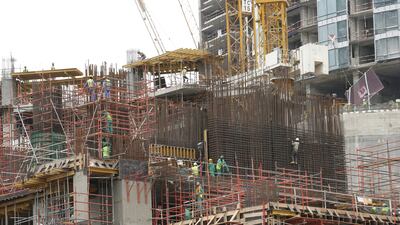The recovery that is already under way in the UAE’s construction sector is likely to lead to an inflation in costs in what has been a fairly moribund sector for the past two years, according to an analyst.
David Clifton, regional development director at Faithful + Gould, said there are signs of increasing activity across the UAE, from proposed new hospitality developments in Ras Al Khaimah in the north through to greater tendering activity in Abu Dhabi to the south.
“When you look at Sharjah, nigh on two-thirds of its budget is infrastructure development this year – and it has a record-breaking budget,” said Mr Clifton.
Contract awards for the first four months in the year in Dubai were 10 to 15 per cent higher than last year, Mr Clifton said, although the dwindling pipeline as major contracts wind down could mean some firms shed more people as projects finish.
“Companies cut harder and faster than they historically would have done, because they learnt their lessons over holding on to people thinking the market was coming back after the financial crisis.”
However, he said that he expects more activity both in Dubai and Abu Dhabi, which has been a quieter market over the past two years.
Mr Clifton said that Abu Dhabi government-owned entities had been “very clever” in commissioning work from contractors at the bottom of the downturn following the global economic crisis, and are currently tendering for other major schemes ahead of the next potential upturn.
“There are two functions in play for Abu Dhabi,” he said. “One is that they are supporting the market – construction represents just shy of 10 per cent of GDP in the UAE.
“The second is that they are getting the cheapest prices on the table that they are going to get for the time being. I think in terms of construction inflation we’ve flatlined – we’re going up now, not down.”
Steve Flint, the group general manager of Khansaheb Civil Engineering, said that for the moment contractors’ margins in the UAE remain under pressure as the market is “extremely competitive”.
“There has been an increasing number of new opportunities but clients continue to demand keen pricing and short programmes for delivery of projects,” he said.
Despite this, Mr Flint agrees that as the year progresses capacity constraints will begin to bite.
“We expect that the increased demand for major new projects and developments will put a strain on UAE contracting capacity,” he said.
“This will be particularly challenging for the supply chain as quality, specialist contractors are in short supply. We also expect supplier prices to increase.”
As a result, he said that he expects construction prices to rise “in the fourth quarter of 2017 and throughout 2018”.
The contracting market in Saudi Arabia, which endured a torrid 2016, is unlikely to pick up as quickly, particularly as the process of getting programme management offices in places to oversee major projects commissioned by ministries and municipalities is still under way.
However, the privatisation ethos that plays a substantial part in the kingdom’s National Transformation Programme is already having an effect, according to Terry Smith, an executive director of Riyadh-based Nassab Group.
Mr Smith’s firm has already put together a number of consortia to bring project proposals to government bodies to build both military and infrastructure assets.
“With the 2030 programme, which is really all about privatisation and minimising the exposure of government payroll, if you’ve got a decent [project] presentation and it gains traction there’s a good chance you can get it to pass,” said Mr Smith.
mfahy@thenational.ae
Follow The National's Business section on Twitter


